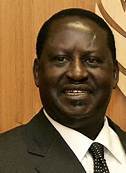Barely four years after the inauguration of the Constitution of Kenya 2010, the same proponents of the constitution who fiercely campaigned for it, are now calling for its amendments through a referendum. Apparently, those behind this agitation have deliberately refused to use the constitutionally provided means to achieve this process.
After his return from a month-long trip from the USA, the Kenyan opposition leader and Coalition for Reforms and Democracy(CORD) leader Mr. Raila Odinga gave the government an ultimatum within which to convey a national dialogue failure to which, he would call for mass action on the famous saba saba day. However contrary to the expectations of many, the rally ended peacefully as the government deployed an estimated 15,000 police around the city, most of whom manned the venue of the rally, Uhuru Park. To the surprise of many, the opposition highlighted 13 deliberations among them the disbarment of the electoral commission and the amendment of the constitution through a referendum process.
The borne of contention however for the call for a referendum is the framework within which the opposition wants the referendum to be conducted. Having said categorically that they would not accept a situation where the Independent Boundaries and Electoral Commission (IEBC) to carry out the poll, and instead called for the UN to conduct the pools, the processes has met serious criticisms and left questions unanswered.
For instance, the only body mandated to conduct elections in Kenya under the constitution is the IEBC. The opposition will therefore be chasing the shadows in seeking for any alternative that is not provided for by the law. Keen to note also, is the fact that it appears to many that Mr. Odinga's strategy whenever he looses elections has always been crying foul and calling for removal of constitutional bodies instead of addressing the issues and building capacities of the same institutions he championed for a few years ago when he was in government.
The problem of elections in Kenya can only be addressed by coming up with mechanisms of having not just free and fair elections but tamper-proof elections. It would be interesting to know that the BVR kits that failed in 2013 elections, had in fact been procured by Mr. Odinga's office (Office of the Prime Minister) when he was in government.It is also important to note that the obvious reasons where the kits failed was purely lack of electricity in some rural areas and inadequate training of the poll officers on the use of the kits.
The opposition's call for a referendum therefore fail to address the issues raised on poverty and ethnicity. It is also important for the opposition to come up with practical means of addressing issues particularly by giving alternatives to government instead of raising political temperatures in the country. Kenya needs to be united especially now that the country is faced with the war on terror.
As it is now, the opposition's quest for referendum is most likely to hit a dead end should they fail to streamline their grievances and remain objective in their criticism against the government.
